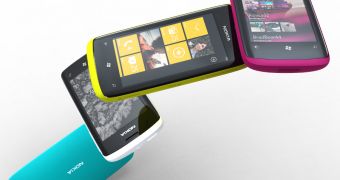Espoo, Finland-based mobile phone maker Nokia is gearing up for the release of its first Windows Phone-based smartphones, and some info regarding the hardware it might use for them started to emerge.
Reports emerged on the possible inclusion of ST-Ericsson chips inside some of these devices, with dual-core processors for increased performance.
Carlo Bozotti, Chief Executive of STMicroelectronics, was the one to confirm the adoption of these chips inside Nokia's future mobile phones, a recent article on Forbes notes.
While the first wave of Windows Phone devices came with strict requirements regarding the hardware manufacturers would use, the next series of handsets would not be confined to the same chips and specs.
As already reported, users should see inside the next Windows Phones application processors clocked in at 800MHz, and not only 1GHz Qualcomm Snapdragon QSD8250 chips as before.
The new chassis specs would allow for the inclusion of Qualcom's MSM7x30 and MSM8x55 products with these devices, and it seems that they would also offer support for processors coming from other companies.
Nokia and ST-Ericsson, a joint venture between STMicroelectronics and Ericsson, have a long history together, and the Finnish handset vendor is reportedly aiming at taking advantage of it for the development of Windows Phone smartphones as well.
However, Bozotti stated that ST-Ericsson is one of the two companies (the other one might be Qualcomm) that would supply chips for Nokia's Windows Phones, which would run under the next release of the mobile platform (that Microsoft has been referring to as Mango, and Forbes calls Windows Phone 8).
The NovaThor U8500 chipset would be packed in some Nokia handsets, a dual-core system-on-a-chip already available on handsets on the market, such as the Android-based Samsung Infuse 4G launched at AT&T only recently.
Not only would Nokia adopt the dual-core chip for some of its first Windows Phones, but it would also release devices based on a new version of the silicon later in 2012, Bozotti stated.
For the time being, Nokia did not unveil specific info on the handsets it would bring to the market with the Windows Phone platform on board, but it did say that over a dozen of them should be launched next year.
The vendor is also expected to bring Windows Phone to more segments of the market, releasing new devices at various price points, something that was not available with the first wave of handsets based on the platform.

 14 DAY TRIAL //
14 DAY TRIAL //